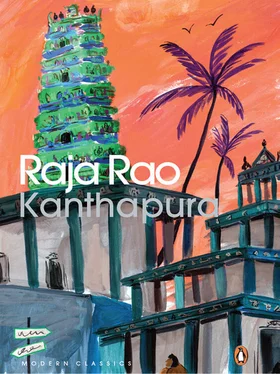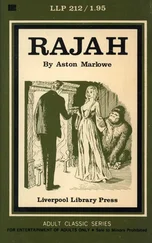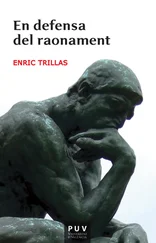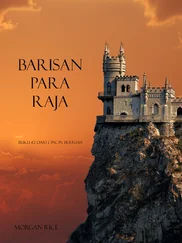Raja Rao - Kanthapura
Здесь есть возможность читать онлайн «Raja Rao - Kanthapura» весь текст электронной книги совершенно бесплатно (целиком полную версию без сокращений). В некоторых случаях можно слушать аудио, скачать через торрент в формате fb2 и присутствует краткое содержание. Год выпуска: 2014, Издательство: Penguin, Жанр: Классическая проза, на английском языке. Описание произведения, (предисловие) а так же отзывы посетителей доступны на портале библиотеки ЛибКат.
- Название:Kanthapura
- Автор:
- Издательство:Penguin
- Жанр:
- Год:2014
- ISBN:нет данных
- Рейтинг книги:3 / 5. Голосов: 1
-
Избранное:Добавить в избранное
- Отзывы:
-
Ваша оценка:
- 60
- 1
- 2
- 3
- 4
- 5
Kanthapura: краткое содержание, описание и аннотация
Предлагаем к чтению аннотацию, описание, краткое содержание или предисловие (зависит от того, что написал сам автор книги «Kanthapura»). Если вы не нашли необходимую информацию о книге — напишите в комментариях, мы постараемся отыскать её.
Kanthapura — читать онлайн бесплатно полную книгу (весь текст) целиком
Ниже представлен текст книги, разбитый по страницам. Система сохранения места последней прочитанной страницы, позволяет с удобством читать онлайн бесплатно книгу «Kanthapura», без необходимости каждый раз заново искать на чём Вы остановились. Поставьте закладку, и сможете в любой момент перейти на страницу, на которой закончили чтение.
Интервал:
Закладка:
And the next morning they rise with the sun, and the men begin to dig pits and to hew wood and the women to pluck weeds and to kill vermin; and when the sun rises high, and one rests his axe for a while to open the tobacco pouch, or one rests his basket to open the betel bag, there he is, the maistri, there behind some jack, and he says, ‘Hè, there! What are you waiting for? Nobody’s marriage procession is passing. Do you hear?’ and when you do not pick up your axe or put your hand to a coffee plant, he rushes down the hill, crunching the autumn leaves beneath him, and up there by the bamboo cluster the red face of the sahib peeps out, and they all swing their arms this way and that and the axes squeak on the tree and the scissors on the leaves. But when the talkative Papamma opens her Ramayana and speaks of the leaks in the roofs and leaks in the measures and leaks in the morals, there’s a crunch of feet again, but it dies away into the silence only to rise on the top of the other shoulder of the hill. And they have hardly begun to work again when Lakkamma cries out, ‘Hè, hè, hè, a snake! a huge snake! a cobra!’ and rushes away to hide behind a tree. And they all leave their work and come to see if there is a snake and what he looks like. But he has disappeared into the bamboo bush; and Pariah Siddayya, who has been in these estates for ten years and more, says never mind, and explains that cobras never harm anyone unless you poke your fuel chip at them; and seating himself on a fallen log, he tells you about the dasara havu that is so clever that he got into the sahib’s drawer and lay there curled up, and how, the other day, when the sahib goes to the bathroom, a lamp in his hand, and opens the drawer to take out some soap, what does he see but our maharaja, nice and clean and shining with his eyes glittering in the lamplight, and the sahib, he closes the drawer as calmly as a prince; but by the time he is back with his pistol, our maharaja has given him the slip. And the sahib opens towel after towel to greet the maharaja, but the maharaja has gone on his nuptial ceremony and he will never be found.
‘Now,’ continues Pariah Siddayya, mopping his face, ‘now as for water snakes, take my word, they are as long as they are silly, like the tongues of our village hussies. They just hang over a streamlet or pond, as though the whole world has closed its eyes. You can pick them up by their tails and swing them round and round, once, twice, thrice, and throw them on the nearest rock you find. If they don’t die, they’ll at least leave basket and bundle for ages to come. But the snake that is as short as he is wicked is the green snake. You would think it was a rope, but when it is beside a bamboo, you would say, “Why! it is a bamboo leaf!” That’s how our Sankamma, gathering cow dung, put her hand out to remove a bamboo leaf, and what should the bamboo leaf do but hiss and fall upon her arm, where by Kenchamma’s grace she had her dung basket, and he, furious, ran back into the thicket like a barking puppy and left a palm’s width of poison on the ground.
‘He is bad enough, the green snake, but you haven’t seen the flying snakes of this country. Now you know the cobra, the python, the green snake, the water snake, the krait and the rattlesnake, and you know how they move. They move like this — on the earth, like all living creatures. But here there’s another monster; he flies from tree to tree, and when your turban is just a little loose, and say your pate uncovered, this fine gentleman merely hangs down and gives you a nice blessing. But thank heavens it is not with us here that he is often found. He likes the sumptuous smell of cardamoms and his home is amongst them. That’s why all these cardamom-garden coolies wear, you know, a slab thin as a cloth on their heads. There was that fellow Mada who died leaving three children and a yelling wife. There was also that bent-legged Chandrayya. He died God knows how, but they found him in the garden, dead. This flying snake, I tell you, is a sly fellow. He is not like the cobra, frank in his attack and never aggressive. Why, the other day there was Ramayya pushing the maistri’s bicycle up through the Wadawalè Ghats, for the maistri had come up in a passing lorry, and the bicycle was left down at the Sukkur police station, and the maistri says, “Go and get it, Ramayya.” So Ramayya goes down that night, and the next morning he says to himself, “Why go by the main road, there’s daylight and I have the bicycle-bell to ring if there’s anything coming.” And so he takes the Kalhapur tank-weir path, and crossing into the Siddapur jungles he is pushing the bicycle when he sees the flat footmarks of a tiger that must have feasted on a deer somewhere, and he says to himself, “This might be difficult business,” and begins to ring the bell. Then, as he is just by a flowering aloe, what should rattle up but a huge cobra as long as this — that the bicycle-wheel had run down. Ramayya cried out, “Ayyo. Ayyoo. ” and ran away. And after a whiff of breath and a thousand and eight Rama-Ramas, he comes back and there is no cobra nor his dirt there, and he takes the bicycle, and looking this side and that side, he runs with it along the footpath and no cobra pursued him.
‘Never, I tell you, has a cobra bitten an innocent man. It was only Chennayya’s Dasappa who ever died of a cobra bite. But then he went and poked his stick into the hole, poked and poked, saying he had the eagle-mark on his hand and never a snake did harm him, but within six months Father Naga slips right into his hut, and, touching neither his grown-up daughter nor his second child, nor his suckling brat nor his wife who lay beside him, it gives him a good bite, right near his bloody throat, and slips away God knows how or where. Barber Ramachandra comes in and wails out this chant and that chant, but he was not a very learned man in his charms, and Dasappa bloody well croaked. ’
And so he goes on, Siddayya, telling story after story, looking to this side and that for signs of the maistri, and they all lime their betel leaves and twist the tobacco leaves and munch on, when suddenly there is neither crunch nor cough, but the maistri’s cane has touched Vanamma and Siddamma and Puttayya, and everyone is at his axe or scissors and never a word is said. And they work on with axe and scissors till the sun’s shadow is dead, and then they go back to their huts to gobble ragi paste and pickles, and when the maistri’s whistle pierces the air, they rise and go, each one to his pit and plant.
But the afternoon sun is heavy and piercing and as each axe splits the wood or as each pick tears the earth, from head and armpit and waist the perspiration flows down the body, and when the eyes are hot and the head dizzy, Rachanna and Chandranna and Madanna and Siddayya lean back against the trunks of the jacks, and the freckled, hard bark sweats out a whiff of moisture that brings out more perspiration and then the body grows dry and balmed; but when the eyes seek the livid skies across the leaves, there is something dark and heavy rising from the other side of the hill, something heavy and hard and black, and the trees begin suddenly to tremble and hiss, and as Rachanna and Chandranna and Madanna and Siddayya strike their axes against the wood, there is a gurgle and grunt from behind the bamboo cluster — and the gurgle and grunt soar up and swallow the whole sky. The darkness grows thick as sugar in a cauldron, while the bamboos creak and sway and whine, and the crows begin to wheel round and flutter, and everywhere dogs bark and calves moo, and then the wind comes so swift and dashing that it takes the autumn leaves with it, and they rise into the juggling air, while the trees bleat and blubber. Then drops fall, big as the thumb, and as the thunder goes clashing like a temple cymbal through the heavens, the earth itself seems to heave up and cheep in the monsoon rains. It churns and splashes, beats against the treetops, reckless and wilful, and suddenly floating forwards, it bucks back and spits forward and pours down upon the green, weak coffee leaves, thumping them down to the earth, and then playfully lounging up, the coffee leaves rising with it, and whorling and winnowing, spurting and rattling, it jerks and snorts this side and that; and as Rachanna and Madanna and Chandranna and Siddayya stand beside the jacks, the drops trickle down the peeling bark, then touch the head; then the back and the waist, and once when the trees have all groaned down as though whipped to a bow, there is such a swish of spray that it soaks their dhotis and their turbans, and they stand squeezing them out. Then somewhere there is a lightning again and suddenly the whole Himavathy valley becomes as clear as under the moon, and in Kanthapura the smoke is seen to rise from every house and curl round the golden dome of the temple, and the streets look red and clear and flat, except for a returning cow or courtyard cart. Then the darkness again, and the trees bend and shiver and the bamboos creak.
Читать дальшеИнтервал:
Закладка:
Похожие книги на «Kanthapura»
Представляем Вашему вниманию похожие книги на «Kanthapura» списком для выбора. Мы отобрали схожую по названию и смыслу литературу в надежде предоставить читателям больше вариантов отыскать новые, интересные, ещё непрочитанные произведения.
Обсуждение, отзывы о книге «Kanthapura» и просто собственные мнения читателей. Оставьте ваши комментарии, напишите, что Вы думаете о произведении, его смысле или главных героях. Укажите что конкретно понравилось, а что нет, и почему Вы так считаете.












